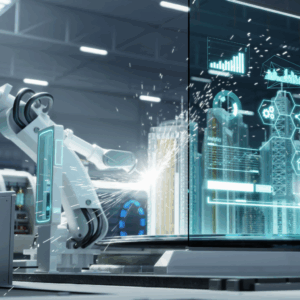About Goevolut
Founded in 2014, Goevolut is a trusted leader in business transformation, leveraging the full spectrum of agentic AI to drive operational efficiency, unlock new value, and enable successful, sustainable change. We specialize in blending proven business strategies with cutting-edge technology modernization to help organizations evolve with clarity, purpose, and measurable impact.
Helping Businesses
Respond To Challenges

Kenneth Gonzalez has long been recognized as a leading change agent for entrepreneurial manufacturing and consumer products businesses. He founded Goevolut as the next generation of his well-known Chicago consultancy Transformation Operating Partners. Ken previously was Global Director of Information Technology for both a major industrial electrical & metal manufacturer and a leading automotive supplier, as well as Global Manager of Business Systems Development for a large packaging company. Ken founded the Southlake, Indiana Hispanic Chamber of Commerce and is a volunteer leader with many area nonprofit associations. He holds an MBA in Decision Science and BS in Business Administration from University of Detroit Mercy.
>> M&A and Carveout Information
Why Choose Goevolut Team?

Goevolut is well-known for our disciplined strategy development and business transformation expertise. Our consulting services are trusted by C-level leaders throughout the Midwest and beyond.
Our mission is to provide clients the ability to manage, measure and implement their internal transformation operating systems… tailor deployment structures… and manage maturity and organization change management to their specific action plans.
We are based in the Purdue Research Park, the largest university-affiliated incubation complex in the country.
See what we have to say:
Management Articles:
 RAPID TRANSFORMATION AND AUTOMATION SOLUTIONS
RAPID TRANSFORMATION AND AUTOMATION SOLUTIONS
by Ken Gonzalez and Santiago Vallejo
The business world is currently experiencing a game-changing revolution, one just as significant as the advent of the internet and distributed computing. We are entering a new industrial era where technology-enabled rapid transformation drives unparalleled value creation. This shift redefines how businesses operate, scale, and grow, with speed and agility that were not possible before. The private equity industry is well-positioned to capitalize on this transformation, improving cash flows, accelerating exits, and ensuring more profitable outcomes for all stakeholders. The integration of Artificial Intelligence (AI), Machine Learning (ML), and Manufacturing 4.0 technologies stands at the heart of this transformation. These technologies are no longer tools for future planning—they are real-time accelerators, enabling firms to innovate, automate, and optimize operations. The ability to gain instant insights and streamline operations allows private equity firms to transform companies far faster than traditional approaches could ever deliver.
The Dated Operating Partner Model
Until recently, private equity firms have relied on dated operating partner models. Typically, they used internal teams, hired former executives, or brought in third-party consultants to guide companies through labor-intensive turnarounds that take years to complete. This approach is no longer timely enough to keep up in today’s rapidly changing market.
The new rapid transformation operating partner model leverages advanced technology (AI) to compress lengthy timelines. Now, firms can tap into automation, machine learning, and advanced robotics to make operational improvements in a matter of months—or even weeks. This model does not just create value faster—it delivers immediate operational efficiency, positioning companies for success towards cultural change from day one.
Automating Operations with AI, Machine Learning, Industry 4.0 and Beyond
A key advantage of the rapid transformation model is the ability to identify and automate core operations instantly. Within Industry 4.0, AI and Machine Learning enable businesses to automate processes that traditionally required time consuming manual work, research, decision-making support, fiscal oversight, and real-time risk control.
In manufacturing environments, this transformation is part of Manufacturing 4.0 – the next industrial revolution.
Why Rapid Transformation is the Future of Private Equity
Technology-enabled rapid transformation is doing for private equity what the assembly line did for manufacturing—it is ushering in a new era of speed, scalability, and efficiency. To summarize, the opportunity this revolution offers is not just about improving operations—it is about automating entire business systems to enable unprecedented growth. In this new era, private equity firms that embrace rapid transformation will outpace their competition, improve rates of return, execute faster turnarounds, and create sustainable value at speeds never experienced within the industry.
 Maximizing Portfolio Value: How AI and ML Are Reshaping Due Diligence and Integration
Maximizing Portfolio Value: How AI and ML Are Reshaping Due Diligence and Integration
by Ken Gonzalez and Santiago Vallejo
In today’s rapidly evolving Private Equity (PE) landscape, gaining and maintaining a competitive advantage requires swift exits and EBITDA growth across sponsored companies, especially in manufacturing. Advanced technologies like Artificial Intelligence (AI) and Machine Learning (ML) have emerged as essential tools for transforming companies at speed and scale. By enhancing due diligence, integration, and portfolio management, AI and ML are reshaping how PE firms assess, invest in, and expand the potential of portfolio companies—leading to quicker, more profitable exits.
The Value of AI and ML in Due Diligence
Historically, due diligence has been labor-intensive, requiring teams to manually sift through extensive data to assess financial health, growth potential, and operational inefficiencies. AI and ML streamline this process by identifying patterns in vast datasets, helping PE firms pinpoint high-potential targets in record time. Algorithms can rapidly assess business models, identify operational risks, and project the impact of various strategic decisions, leading to data-driven conclusions that maximize investment value.
Machine learning, for example, can analyze financial patterns and supply chain data to identify cash flow risks or market shifts that might affect the company’s outlook. AI-driven analytics not only deliver insight at a faster pace but also provide a more nuanced understanding of market dynamics, guiding PE firms toward investments that align with their strategic vision.
Integrating AI and ML in the Post-Acquisition Landscape
Once a target company is acquired, integration becomes paramount, especially in manufacturing, where process optimization can significantly impact EBITDA growth. AI and ML can streamline this phase by aligning business processes, harmonizing supply chains, and integrating IT systems to enable rapid operational synergies. This ability helps companies achieve faster exits with higher returns.
In manufacturing, for instance, machine learning can predict performance outcomes by integrating real-time supplier inputs, production parameters, and quality metrics. Such insights allow for continuous improvement in production efficiency, allowing portfolio companies to scale seamlessly, enter new markets, and respond to demand shifts. Real-time insights enable sponsored companies to adjust processes dynamically, ensuring they meet market demands without sacrificing quality.
Automating Decision-Making for Faster Growth
AI and ML are not limited to data analysis; they also empower portfolio companies with the automation needed to respond to real-time market changes. By automating complex tasks such as supply chain orchestration, product design, and customer engagement, AI reduces time-to-market for new products, accelerates market entry, and enables companies to pivot quickly in response to customer needs and competitive shifts.
Automated decision-making tools within AI-driven systems allow PE firms to minimize the time required for portfolio companies to achieve profitability and reach ideal exit conditions. This dynamic adaptability is crucial for staying ahead of competitors and maximizing returns for investors.
Risk Management and Scalability with AI and ML
While AI and ML provide unparalleled insights and capabilities, careful implementation is necessary to manage associated risks. Ensuring that data integration, system compatibility, and workforce readiness align with ML-driven processes is essential for seamless adoption. Success hinges on selecting ML applications that match the technical maturity of the organization, establishing clear timelines, and demonstrating the long-term benefits of these technologies to stakeholders.
Once integrated, AI and ML allow companies to scale operations without incurring proportional increases in cost or complexity. This scalability supports efficient growth, enabling companies to handle more volume, anticipate demand fluctuations, and allocate resources effectively. For PE firms, this means quicker exits, IRR targets met, and improved exit multiples.
Why Act Now?
The digital transformation wave is sweeping across the market, creating a limited-time window for PE firms to lead and capture a competitive edge through AI and ML. With competitors moving fast to adopt these tools, early movers can realize outsized gains by positioning their sponsored companies for exponential growth, particularly in manufacturing. Acting now not only accelerates exits but also sets companies up for sustainable success in a market that increasingly rewards technological agility.
The Competitive Edge: AI and ML for Sustainable Value
AI and ML are revolutionizing the PE industry by enhancing due diligence and integration and providing portfolio companies with a competitive edge. For PE firms, integrating AI and ML isn’t just a technological upgrade—it’s a strategic imperative that empowers sponsored companies to unlock growth, optimize processes, and achieve successful exits. By harnessing these technologies, PE firms can maximize portfolio value, deliver better returns for investors, and solidify their position as leaders in a dynamic and competitive marketplace.
 by Santiago Vallejo & Ken Gonzalez
by Santiago Vallejo & Ken Gonzalez
In today’s Private Equity (PE) landscape, firms must leverage cutting-edge technologies like Artificial Intelligence (AI) and Machine Learning (ML) to drive value creation. Accelerated exits and EBITDA growth are essential for success. Competitive advantage increasingly lies in advanced design and development processes that enable portfolio companies to innovate, scale, and adapt with precision, unlocking new opportunities and maximizing value. Through AI-driven design tools, PE firms can streamline and enhance the product development lifecycle.
The Benefits of AI in Product Development for Private Equity
According to a McKinsey report, companies that leverage AI in their operations see an average 20% reduction in product development time and a 15% boost in EBITDA. AI-driven generative design allows companies to input constraints, such as material type and strength, to generate optimized component designs faster than human engineers could achieve. Additionally, AI-powered simulations accelerate product testing, predicting performance under various conditions and reducing the need for costly prototypes. This approach shortens development cycles, minimizes errors, and drives innovation, giving PE firms a significant edge.
Why Private Equity Firms Must Act Now
The PE landscape is evolving rapidly, with market demands pushing for faster, AI-integrated development. Firms that leverage AI and ML to streamline product development are well-positioned to turn portfolio companies into agile innovators. By adopting AI-driven design tools, PE Operating Partners can accelerate iteration cycles and create breakthrough features that build competitive advantage. Early adoption of these technologies can set the pace for portfolio optimization in a digital-first world.
Leading PE firms like Blackstone and KKR are already investing in AI and ML. Blackstone has developed a dedicated data science team to implement AI strategies, contributing an estimated $200 million in EBITDA impact. Similarly, KKR’s Digital and Analytics team is focused on data-driven value creation across its investments.
AI and ML in Action: Use Cases in Design and Development
ML’s real-world value is evident in practical applications that drive financial and operational outcomes. For instance, generative design tools in the automotive sector allow companies to create lighter and stronger components, enhancing fuel efficiency and reducing emissions. AI-powered simulations enable real-time testing, allowing companies to refine products without the need for costly physical prototypes.
PE-backed companies can benefit from digital twins and AI-driven simulations that model real-world conditions, such as crash outcomes, enabling safer and more efficient designs. Companies like BMW use these tools to iterate rapidly, enhancing safety features while reducing time-to-market. This approach enables PE firms to drive faster growth and maximize returns.
Real-Time Automation: Accelerating Development and Market Expansion
AI and ML are transforming product design by automating complex, data-intensive tasks in real time. From material sourcing to iterative design adjustments, AI-driven automation makes development workflows more agile and responsive. Real-time AI systems monitor market trends and customer preferences, allowing design teams to refine products on demand. This adaptability accelerates innovation cycles and strengthens market positioning, enhancing exit multiples and speeding returns for PE firms.
AI also enhances additive manufacturing (AM), optimizing design and speeding up prototyping. By integrating AI with AM, companies can use generative design algorithms to create complex, lightweight structures not feasible with traditional methods. AI-driven simulations reduce physical prototypes, shortening prototyping cycles and saving on material costs.
Mitigating Risk in AI/ML and Additive Manufacturing Integration
While AI and ML offer substantial potential in product development, effective implementation requires data alignment, infrastructure readiness, and skilled teams. A Boston Consulting Group report notes that PE-backed companies aligning AI/ML use cases with strategic goals saw a 40% higher success rate in AI projects. Such alignment ensures that technology deployments directly contribute to operational resilience and stakeholder confidence.
Why Private Equity Firms Need to Embrace AI and ML Now
A recent McKinsey & Company report shows that early adopters of AI-driven product development achieved a 5-10% revenue increase and a 15-20% improvement in operational efficiency. In industries like automotive and advanced manufacturing, AI-driven tools have reduced development time by as much as 30%, providing a clear path to market and enhancing competitiveness.
Firms that move quickly to incorporate AI and ML in design and development are positioned to secure profitable returns and accelerated exits. The window to lead through AI adoption in product development is now open, and those who act decisively will capitalize on this competitive edge.
 Manufacturing with Real-Time Orchestration
Manufacturing with Real-Time Orchestration
by Ken Gonzalez and Santiago Vallejo
In a competitive landscape, Private Equity (PE) firms face increasing pressure to drive efficiency and improve portfolio performance. Automation and real-time monitoring offer powerful ways to achieve these goals by reducing costs and enhancing productivity. By streamlining operations, these technologies enable PE-backed companies to cut waste, make faster decisions, and increase operational resilience—key factors for achieving profitable exits.
The Value of Automation and Real-Time Monitoring
Automation reduces labor-intensive, repetitive tasks, allowing companies to focus their workforce on high-value activities. Real-time monitoring, on the other hand, provides live operational insights, helping detect inefficiencies and potential issues before they become costly problems. Together, they support continuous improvement, allowing PE firms to build leaner, more scalable businesses that are better positioned for growth and market agility.
Practical Applications in PE-Backed Companies
- Streamlined Manufacturing Operations: Automation helps companies standardize core manufacturing tasks, reducing errors and costs. Real-time monitoring systems enhance this by identifying process deviations that could lead to production delays, allowing preventive measures that protect output quality and consistency.
- Optimized Inventory Management: Automated inventory systems track demand patterns and adjust stock levels based on real-time data, reducing both excess inventory and stockouts. This dynamic inventory control improves cash flow and minimizes holding costs, bolstering EBITDA and long-term profitability.
- Predictive Maintenance: Real-time data allows companies to shift from scheduled maintenance to predictive maintenance, which reduces downtime and extends the lifespan of key assets. This approach is especially valuable for industrial companies, as it minimizes unexpected costs associated with equipment failure.
- Automated Customer Service: Automation in customer service, such as AI chatbots, enables companies to handle routine inquiries efficiently, reducing labor costs while improving response times and customer satisfaction—both important metrics for sustainable growth.
Financial Impact of Automation and Real-Time Monitoring
Automation and real-time monitoring deliver substantial financial benefits. Studies suggest companies implementing these technologies reduce relevant operational costs by 20-30% and boost productivity by up to 15%. For PE-backed companies, this means a leaner cost structure, stronger cash flow, and increased appeal to potential buyers. Real-time monitoring also enhances transparency, making financial forecasting and due diligence more accurate, which is crucial for achieving successful exits.
Challenges and Strategic Solutions
Implementing automation and monitoring systems can present challenges related to infrastructure, workforce skills, and data compatibility. PE firms can address these by aligning automation initiatives with the company’s strategic goals, investing in employee training, and rolling out systems in phases to manage risk and maximize ROI. According to Boston Consulting Group, companies that follow these steps see a 40% higher success rate in their technology projects.
A New Era of Operational Efficiency
Automation and real-time monitoring are essential tools for PE firms striving to build efficient, scalable, and profitable portfolio companies. By adopting these technologies, PE firms can drive meaningful cost reductions, improve productivity, and enhance exit values. In a digital-first economy, automation isn’t just a competitive advantage—it’s a crucial strategy for achieving long-term success.
 Maximizing Portfolio Value: How AI and ML Transform Due Diligence and Integration for Faster, High-Value Exits in Private Equity
Maximizing Portfolio Value: How AI and ML Transform Due Diligence and Integration for Faster, High-Value Exits in Private Equity
by Ken Gonzalez and Santiago Vallejo
In today’s competitive Private Equity (PE) landscape, accelerating exits and driving EBITDA growth across portfolio companies are essential for staying ahead. Artificial Intelligence (AI) and Machine Learning (ML) are now central to these strategies, particularly in sectors like manufacturing, where operational efficiency and scalability are paramount. These advanced technologies, combined with tools like additive manufacturing and IoT, are revolutionizing due diligence, integration, and portfolio management. By harnessing AI and ML, PE firms can expedite their investment processes, enhance portfolio performance, and achieve faster, more profitable exits.
Enhancing Due Diligence with AI and ML
Due diligence has traditionally been a time-consuming, labor-intensive process involving extensive data analysis to evaluate financial health, growth potential, and operational risks. With AI and ML, the due diligence process is drastically accelerated and refined.
Machine learning algorithms can quickly analyze years of customer data, uncovering patterns and insights that would take human teams, weeks to detect. These insights might include predicting customer churn, identifying operational inefficiencies, or flagging potential compliance risks. This shift not only speeds up due diligence but also ensures a level of precision that was previously unattainable.
AI also links due diligence directly to post-acquisition strategies. For instance, AI-driven analysis can reveal high-cost suppliers or inefficiencies in the supply chain—critical data points that inform immediate cost-saving measures and operational improvements after the deal closes.
Streamlining Post-Acquisition Integration
Effective post-acquisition integration is crucial for realizing the full value of an investment. AI and ML play a vital role by providing actionable insights that help integrate acquisitions smoothly and swiftly.
In the manufacturing sector, machine learning can predict operational outcomes by integrating real-time data from suppliers, production parameters, and quality metrics. These insights allow companies to optimize processes dynamically, scale quickly, and meet market demands without compromising on quality.
Automating decision-making that identify key areas for improvement in product lifecycle management, marketing and sales, supply-chain management, and customer service, PE firms accelerate EBITDA growth and reduce the time it takes to reach profitable exits. Moreover, AI helps PE firms align integration efforts with overall portfolio strategies.
Automating Growth for Faster Profitability
One of the key advantages of AI and ML is the ability to automate complex, time-consuming tasks, freeing up resources for strategic activities that drive growth. In portfolio companies, automation accelerates responsiveness to market shifts, allowing businesses to adapt quickly to changing customer needs, optimize supply chains, and innovate faster than competitor. Combined with the right predictive analytics these strategies accelerate the power of decision making.
For PE firms, automation not only boosts revenue but also reduces operational risks, ensuring that companies scale efficiently and sustainably. Essential capabilities for meeting key IRR (Internal Rate of Return) and RONCE (Return on Net Capital Employed) investment metrics thus enabling quicker, more profitable exits resulting from best in class real-time planning and operating in control to realize strategy goals and objectives.
Managing Risks and Enhancing Scalability
AI and ML also play a pivotal role in risk management. By integrating data across systems, ensuring compatibility, and preparing the workforce for technological adoption, PE firms can mitigate potential risks associated with scaling operations.
For example, machine learning can predict supply chain disruptions, allowing companies to proactively manage inventory and production schedules. Additionally, AI-driven analytics help identify and resolve emerging risks before they become significant threats, providing PE firms with the confidence to scale their investments while maintaining stability.
The Urgency to Act Now
The digital transformation wave sweeping the market presents a unique opportunity for PE firms to leverage AI and ML for competitive advantage. As competitors rapidly adopt these tools, early movers can position their portfolio companies for exponential growth, particularly in manufacturing sectors. By embracing AI and ML now, PE firms can not only accelerate exits but also future proof investments for long-term success.
Conclusion: AI and ML for Sustainable Value Creation
AI and ML are no longer just “nice-to-have” technologies in Private Equity—they are strategic imperatives. By enhancing due diligence, streamlining integration, and enabling scalable growth, these technologies empower PE firms to maximize portfolio value and deliver superior returns to investors. Embracing AI and ML not only positions firms for faster, more profitable exits but also strengthens their competitive edge in an increasingly tech-driven market.
Let’s get started your project with professional way

